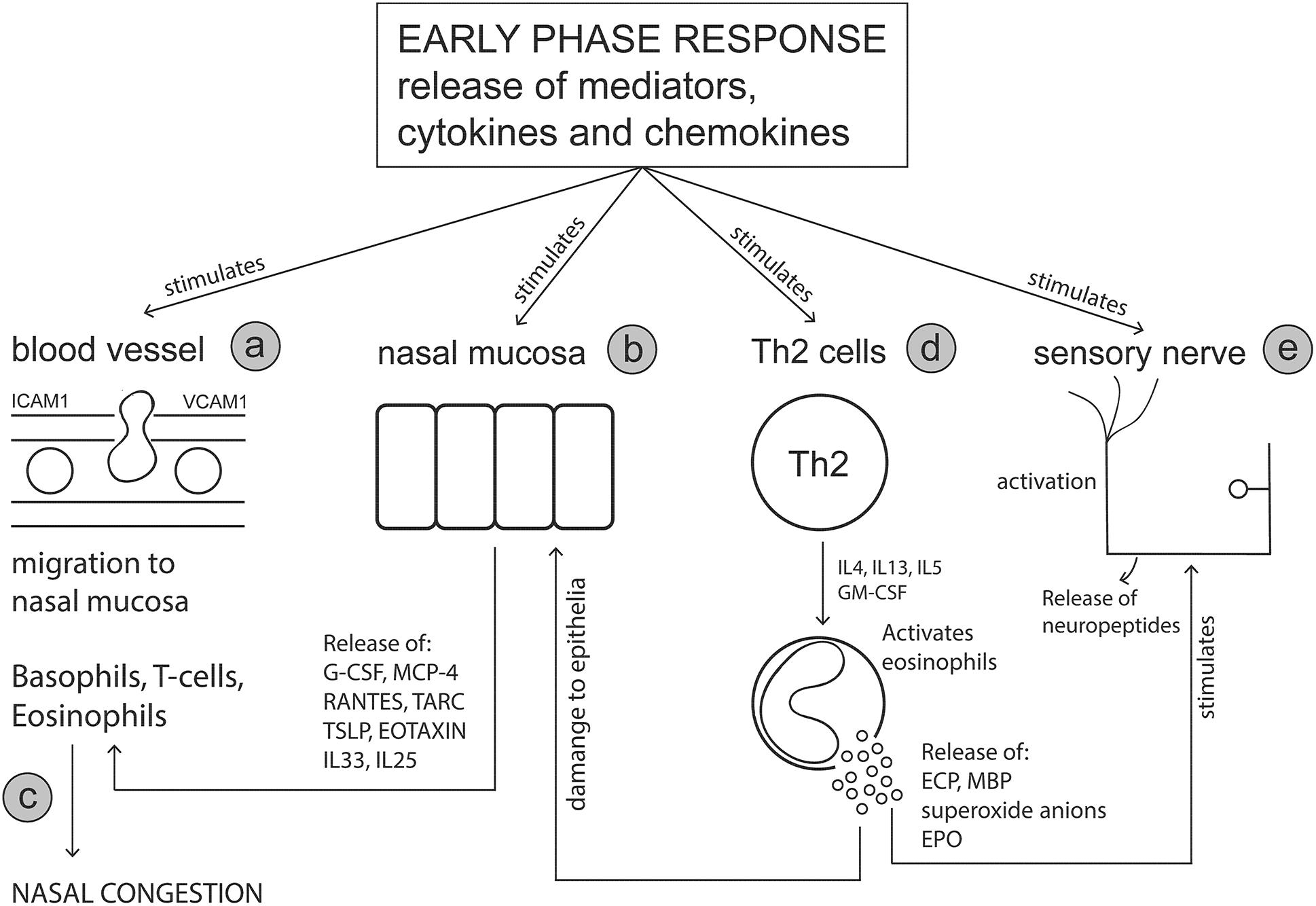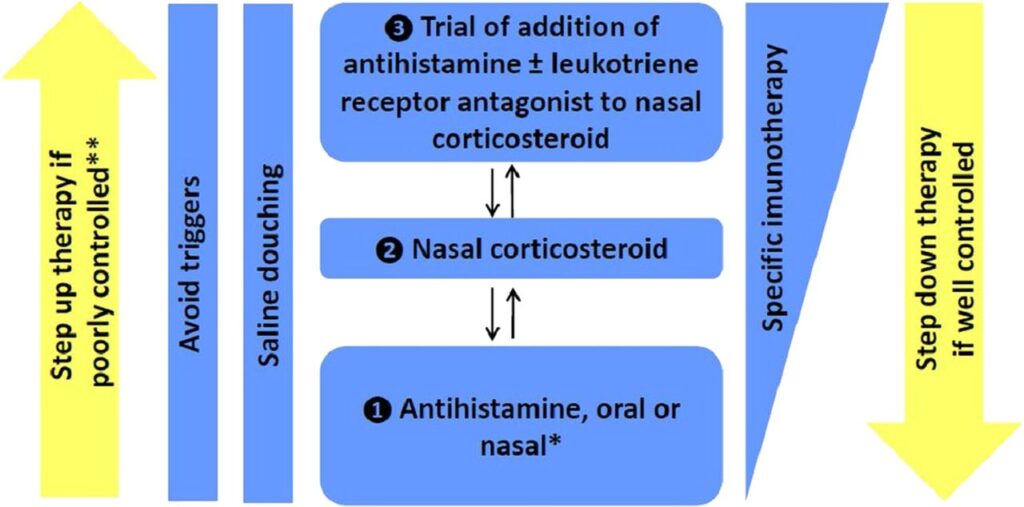Nasal inflammation, commonly referred to as rhinitis, is a condition that affects millions of people worldwide. It involves swelling and irritation of the nasal passages, often leading to symptoms like sneezing, congestion, and a runny nose. Rhinitis can be classified into different types based on its causes and duration, and understanding these distinctions is crucial for effective management. This article delves into the various forms of nasal inflammation, explores their triggers, and outlines available treatment options.

Understanding Nasal Inflammation
Nasal inflammation occurs when the lining of the nasal passages becomes irritated or swollen. This reaction can result from a variety of factors, including allergens, infections, and environmental irritants. The condition is not life-threatening in most cases, but it can significantly impact quality of life by causing discomfort and interfering with daily activities.
Common Symptoms of Nasal Inflammation
- Sneezing
- Nasal congestion
- Runny nose
- Itchy nose, throat, or eyes
- Postnasal drip
- Reduced sense of smell
These symptoms may vary in intensity depending on the type of nasal inflammation and the individual’s sensitivity to triggers.
Types of Nasal Inflammation
Nasal inflammation can be categorized into two main types: allergic and non-allergic. Each type has distinct characteristics and underlying causes.
Allergic Nasal Inflammation
Allergic nasal inflammation occurs when the immune system overreacts to harmless substances, such as pollen, dust mites, or pet dander. This overreaction leads to the release of chemicals like histamine, which cause the nasal passages to swell and produce excess mucus.
Seasonal Allergic Nasal Inflammation
Seasonal allergic nasal inflammation is triggered by outdoor allergens that are more prevalent during specific times of the year. Common culprits include tree pollen in the spring, grass pollen in the summer, and weed pollen in the fall.
Perennial Allergic Nasal Inflammation
Perennial allergic nasal inflammation occurs year-round and is usually caused by indoor allergens like dust mites, mold spores, and pet dander. People with this condition may experience persistent symptoms regardless of the season.
Non-Allergic Nasal Inflammation
Non-allergic nasal inflammation is not related to the immune system’s response to allergens. Instead, it is often triggered by environmental factors, medications, or underlying health conditions.
Vasomotor Nasal Inflammation
Vasomotor nasal inflammation is caused by an overreaction of the blood vessels in the nasal passages. Common triggers include changes in temperature, humidity, strong odors, and exposure to smoke or pollution.
Infectious Nasal Inflammation
Infectious nasal inflammation is typically caused by viral infections, such as the common cold or the flu. Bacterial infections can also lead to nasal inflammation, although this is less common.
Hormonal Nasal Inflammation
Hormonal changes, such as those occurring during pregnancy or due to thyroid disorders, can lead to nasal inflammation. This type is often temporary and resolves once hormone levels stabilize.
Medication-Induced Nasal Inflammation
Certain medications, including over-the-counter decongestants, blood pressure drugs, and antidepressants, can cause nasal inflammation as a side effect. Prolonged use of nasal sprays containing decongestants can also lead to rebound congestion.
Triggers of Nasal Inflammation
Identifying and avoiding triggers is a key step in managing nasal inflammation. Triggers can vary widely depending on the type of inflammation and the individual’s sensitivities.
Allergens
- Pollen from trees, grasses, and weeds
- Dust mites found in bedding, carpets, and upholstered furniture
- Mold spores present in damp environments
- Pet dander from cats, dogs, and other animals
Environmental Factors
- Air pollution and smog
- Strong odors from perfumes, cleaning products, and cigarette smoke
- Changes in temperature and humidity
Infections
- Viral infections like the common cold
- Bacterial infections, though less common
Medications
- Over-the-counter decongestant nasal sprays
- Blood pressure medications like beta-blockers
- Nonsteroidal anti-inflammatory drugs
Hormonal Changes
- Pregnancy
- Menstrual cycles
- Thyroid disorders
Treatment Options for Nasal Inflammation
The treatment of nasal inflammation depends on its type and severity. A combination of lifestyle changes, medications, and sometimes medical procedures may be necessary to alleviate symptoms.
Lifestyle Modifications
Making certain adjustments to your environment and habits can help reduce exposure to triggers and minimize symptoms.
- Use air purifiers to remove allergens from indoor spaces
- Wash bedding frequently in hot water to eliminate dust mites
- Keep windows closed during high pollen seasons
- Avoid smoking and exposure to secondhand smoke
Medications
Several types of medications are available to treat nasal inflammation. These include:
Antihistamines
Antihistamines block the effects of histamine, a chemical released during allergic reactions. They are available in oral and nasal spray forms and can help relieve sneezing, itching, and a runny nose.
Decongestants
Decongestants reduce nasal swelling and improve airflow through the nasal passages. They are available as oral medications or nasal sprays. However, nasal decongestant sprays should not be used for more than three consecutive days to avoid rebound congestion.
Nasal Corticosteroids
Nasal corticosteroids are highly effective at reducing inflammation in the nasal passages. They are available as prescription or over-the-counter sprays and are considered safe for long-term use.
Leukotriene Receptor Antagonists
These medications block the action of leukotrienes, chemicals involved in the inflammatory response. They are primarily used to treat allergic nasal inflammation and asthma.
Immunotherapy
For individuals with severe allergic nasal inflammation, immunotherapy may be recommended. This treatment involves gradually exposing the immune system to increasing amounts of allergens to build tolerance over time. Immunotherapy can be administered through allergy shots or sublingual tablets.
Surgical Interventions
In rare cases where nasal inflammation is caused by structural issues, such as a deviated septum or nasal polyps, surgery may be necessary. Procedures like septoplasty or polypectomy can improve airflow and reduce symptoms.
Managing Nasal Inflammation in Daily Life
Beyond medications and treatments, adopting healthy habits can play a significant role in managing nasal inflammation. Here are some practical tips:
- Stay hydrated to thin mucus and reduce congestion
- Use a saline nasal rinse to clear allergens and irritants from the nasal passages
- Maintain a clean and well-ventilated home environment
- Monitor pollen counts and plan outdoor activities accordingly
When to Seek Medical Attention
While nasal inflammation is often manageable with self-care and over-the-counter treatments, certain situations warrant a visit to a healthcare provider. These include:
- Symptoms that persist despite treatment
- Severe or worsening congestion
- Frequent nosebleeds
- Suspected sinus infection, indicated by facial pain or fever
Emerging Research and Future Directions
Ongoing research continues to explore new ways to diagnose and treat nasal inflammation. Advances in biologic therapies, which target specific components of the immune system, hold promise for individuals with difficult-to-manage symptoms. Additionally, studies are investigating the role of gut health and the microbiome in allergic conditions, potentially opening new avenues for prevention and treatment.





